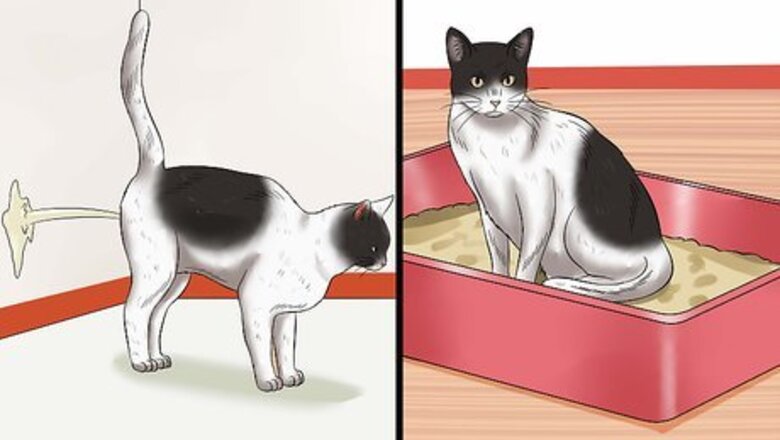
views
Determining the Cause of the Spraying
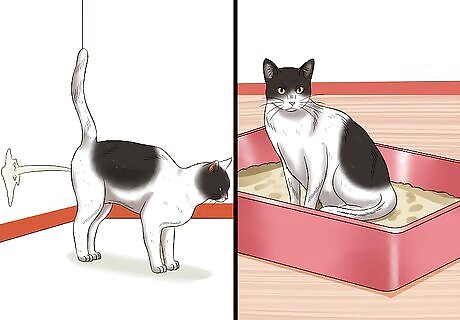
Know the difference between spraying and urinating. Spraying, or urine marking, is communicative behavior that can be caused by a variety of factors. Urinating, however, is usually due to need and can often be attributed to a litter box issue alone. Spraying marks are found on vertical surfaces as a cat sprays by backing up into an object. They also have less volume than simple urinating. The urine emitted during spraying will smell stronger as the cat releases certain chemicals to send messages to other cats. Spraying is more common in un-neutered males, multiple cat households, and in households where there have recently been changes.
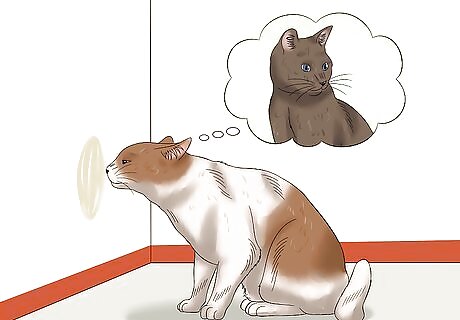
Understand why a cat sprays. To stop the behavior, you must understand the reasons cats spray. Spraying is a way to communicate with other cats, and knowing what your cat is trying to communicate is key to fixing the problem. Cats are territorial and like to claim certain things and areas. Urine marking is your cat's way of letting other cats know of his presence and which portions of the house belong to him. If you live in a multiple cat household, your cat is likely claiming territory. Spraying is also a mating ritual for cats. Spraying is very common during mating season, and the pheromones in the cat's urine communicate their availability to breed. If your cat is not neutered, he may be spraying for this reason.

Figure out why your cat is spraying. Now that you know the causes for spraying, ask yourself a series of questions about your own house. This can illuminate the reasons your cat may be spraying. Is there a new baby or pet? This might mean your cat feels threatened and wants to mark his territory. Are there any neighborhood cats that could be coming into your yard, causing your cat stress? Have there been any changes to your cats routine? Cats dislike change, and sometimes act out when their routine is disrupted. Do you have multiple cats in your home? If so, do they all have enough space? Have there been any changes to the litter box lately?
Fixing Stress Related Issues
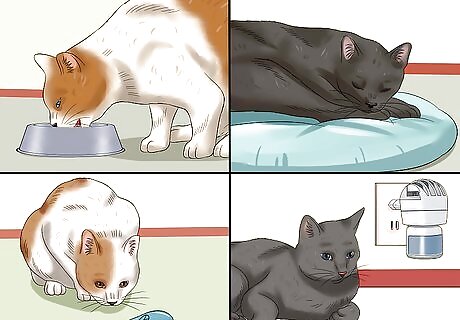
Keep things routine. Changes in a household can cause stress that triggers a cat's insecurity, leading him to spray to claim his space. If your cat has been spraying, establishing a routine can reduce his stress and eliminate spraying. Feed your cat at the same time each day, and keep his litter box, bed, and toys in the same areas. If you have company, put your cat in a separate room. This is especially important if your visitors have cats of their own whose scents may be transmitted via their clothing. This can trigger stress, and in turn spraying. Certain pheromone sprays, available at most pet stores, are designed to calm cats. If you know a big change is coming, such as a new household member or pet, investing in one of these sprays can help cats transition.
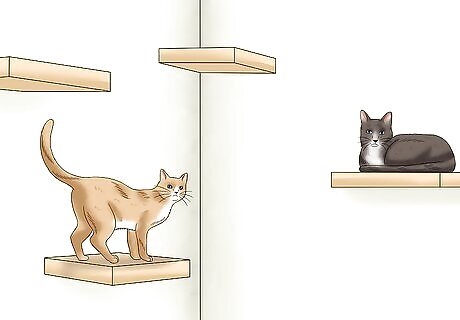
Make sure your cats are getting enough space. If you live in a multiple cat household, spraying is often a result of a cat's territorial nature. Making sure all your cats have adequate space can reduce spraying. Provide multiple perches. Cats love to be up high to observe. You can either clear a window sill or space on a bookshelf or purchase cat condos/cat trees from local pet stores. Have multiple sources of food, water, scratching posts, and toys available. Provide more than one litter box. Although spraying is different from urinating, limited litter box space can trigger territorial responses like spraying. Invest in more than one litter box, and scoop both daily.
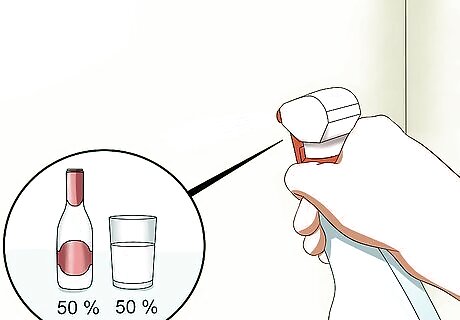
Clean the urine thoroughly. Repeated spraying often comes in response to the scent of a cat's urine, especially in multiple cat households. Pet odors needs to be neutralized in order to stop recurrence. Use an enzymatic cleaner to eliminate the odors. Anything that can be washed in a washing machine should be, using standard detergent. A concoction made from 50% water and 50% white vinegar can be placed in a spray bottle and squirted onto surfaces where a cat has sprayed. This neutralizes the odor and discourages future spraying. Local pet stores, branches of Petco, and even some supermarkets and department stores sell cleaners laced with synthetic pheromones and certain enzymes that remove odors that encourage spraying.
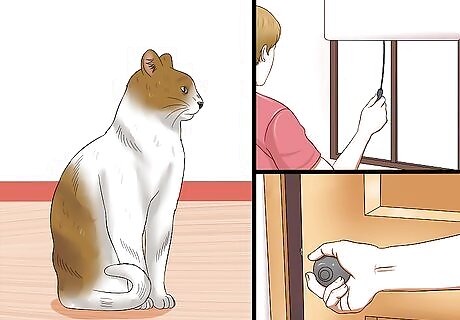
Limit contact with the outdoors. Oftentimes, conflict with a neighborhood cat results in spraying. Even if your cat is not allowed outdoors, if they see or smell a cat through the window they may resort to spraying. Move furniture your cat likes to perch on away from the window. Consider investing in a cat tree to give them an alternative resting spot. Close windows, blinds, or doors. Consider attaching a motion detection devise to your lawn sprinkler, which will cause the sprinkler to squirt water towards your cat when he goes to the window.
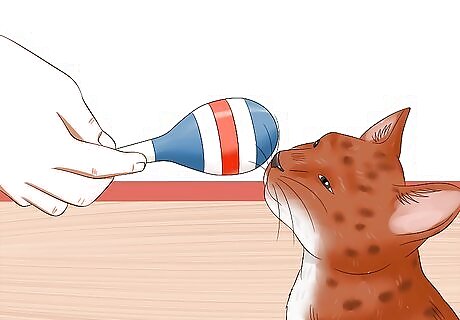
Help cats adjust to any new family members. A new baby can cause spraying as your cat wants to make sure his territory is not being invaded. You need to ease your cat into this transition to make sure he doesn't start spraying. Keep on a schedule, even if it's tough. When the new baby, your schedule will probably change dramatically. Try as best you can to keep consistent with your cats feeding, sleeping, litter box cleaning schedule. Do not give your cat extra attention before the baby arrives, as he will become accustom to added affection. This will result in a bigger letdown when the baby comes, which might make your cat act out for attention. Introduce new toys and baby supplies to your cat by letting him smell and examine them after unwrapping. Anything with a new or unfamiliar smell can cause spraying.
Seeking Medical Intervention

Have a veterinary check up. While spraying is usually a behavioral problem, if making certain household adjustments does not resolve the issue a trip to the vet is needed. A basic exam can rule out or identify and treat any medical problems that may be causing the spraying. Bladder control issues, especially in older cats, can be a sign of serious problems like organ failure.

Neuter your cat. If your cat is not fixed, this may be what's causing the spraying as the behavior is used to advertise to mates. Spraying is a sign of sexual maturity in cats, and having your cat fixed can stop the behavior. If possible, have your cat neutered before he is 6 months old. More than 90% of cats will not start spraying if they're fixed in this time frame. In older cats, roughly 87% will stop spraying after being neutered. While the majority stop immediately, a little under 10% will take a few months to cease spraying.
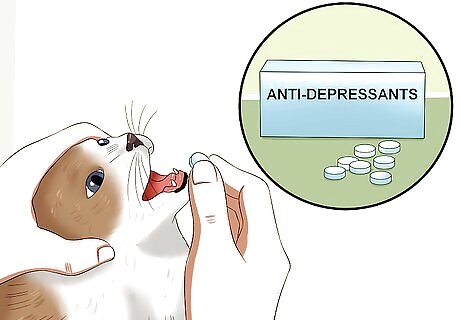
Seek medications. Spraying, even when caused by stress or anxiety, can be treated with certain medications prescribed by a veterinary professional. Anti-depressants and anti-anxiety medications, given orally, can be obtained by consulting your vet. These can ease tensions caused by a multiple cat household or anxiety caused by an erratic schedule. Always consult with a veterinarian, and know your cats medical history. Certain medical issues can interact poorly with medications. All medication has potential side effects. Ask your vet what side effects to look for, and how severe such side affects are, before giving your cat any meds.


















Comments
0 comment